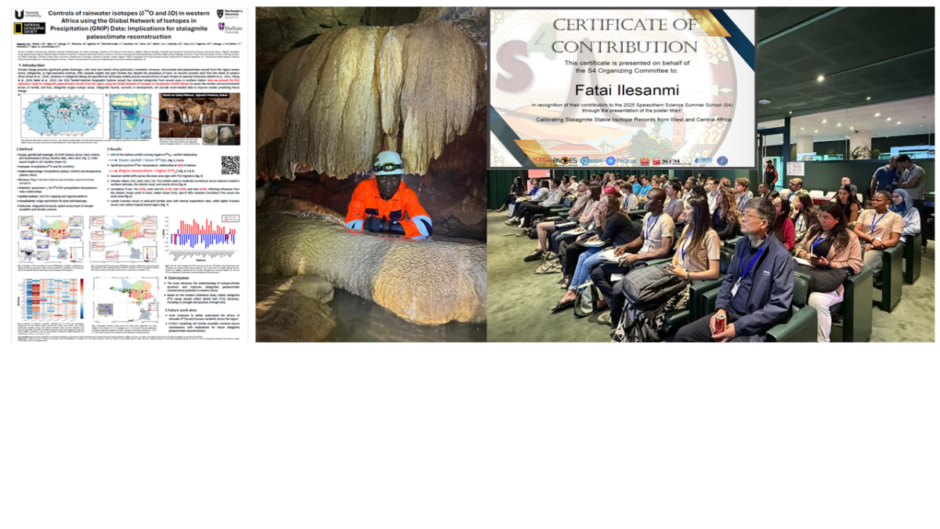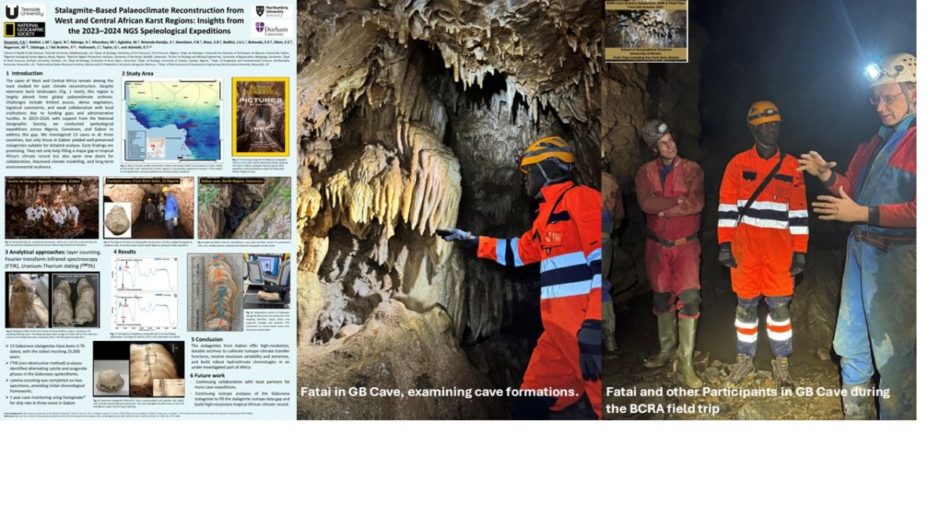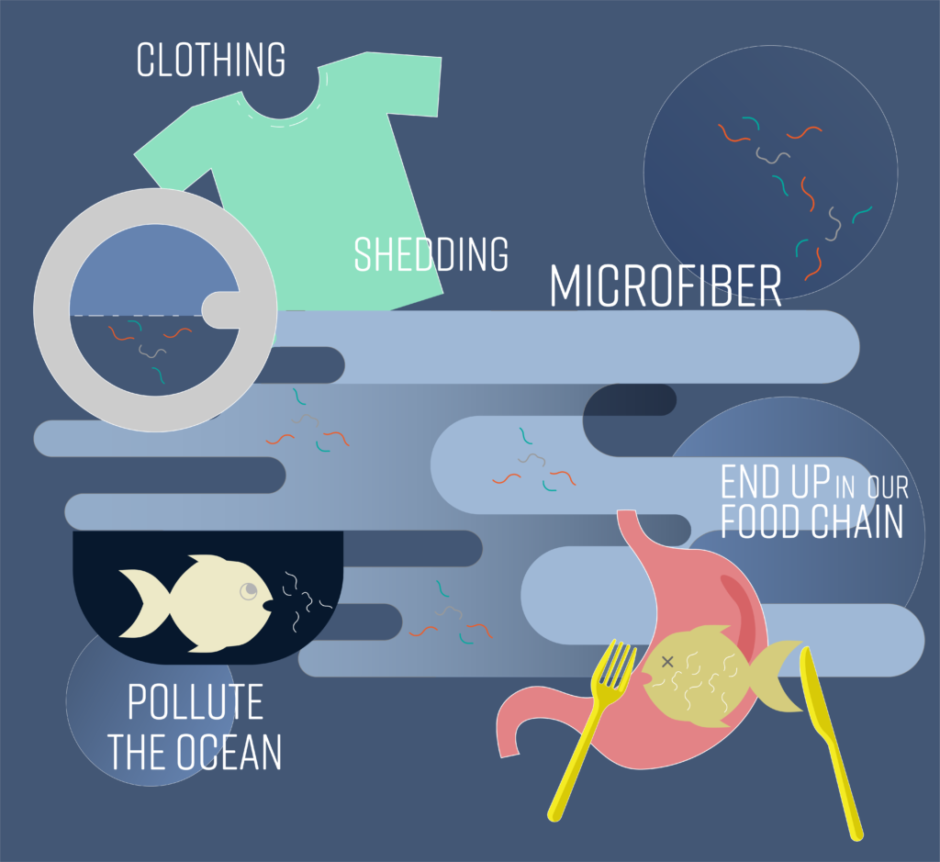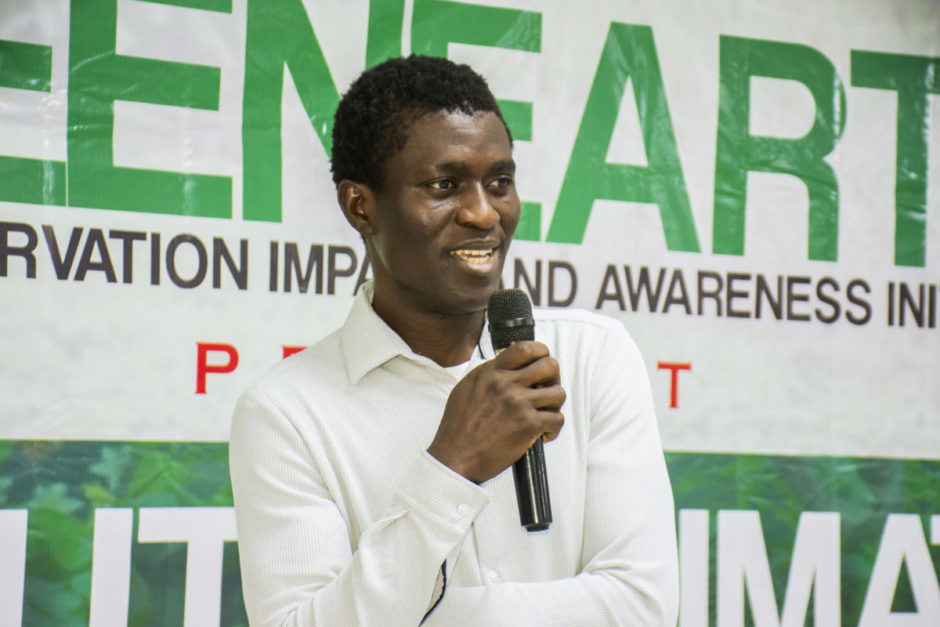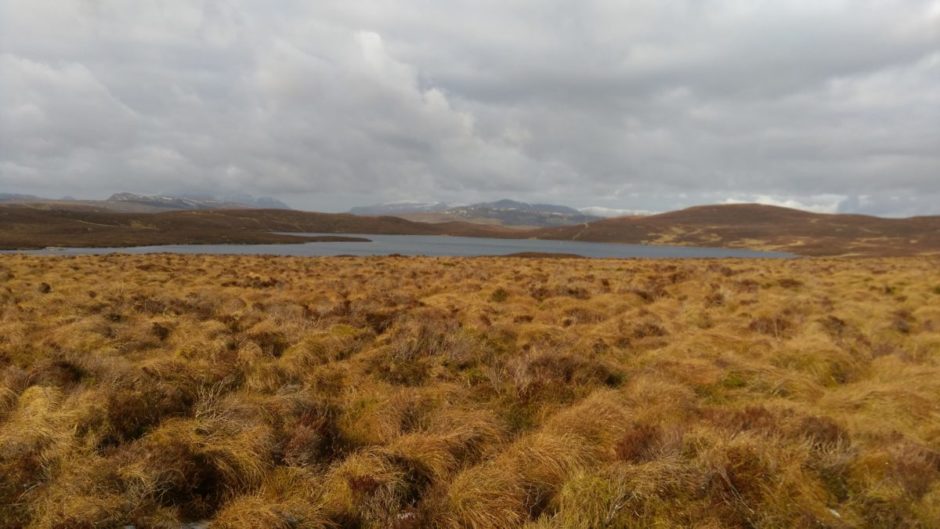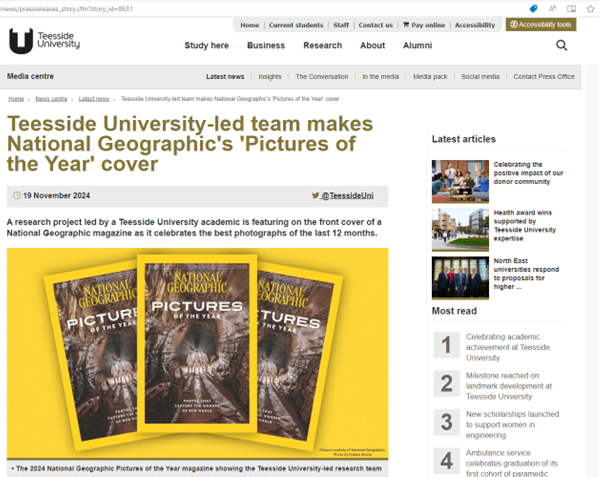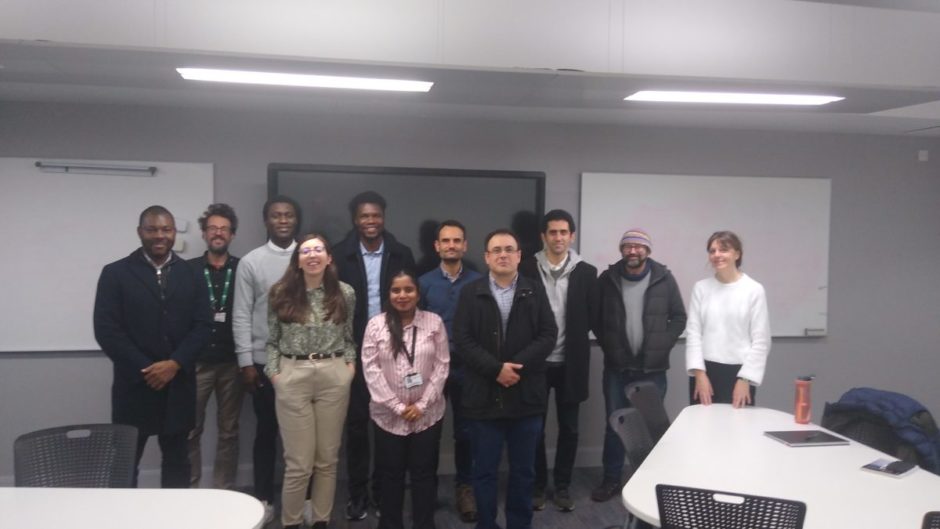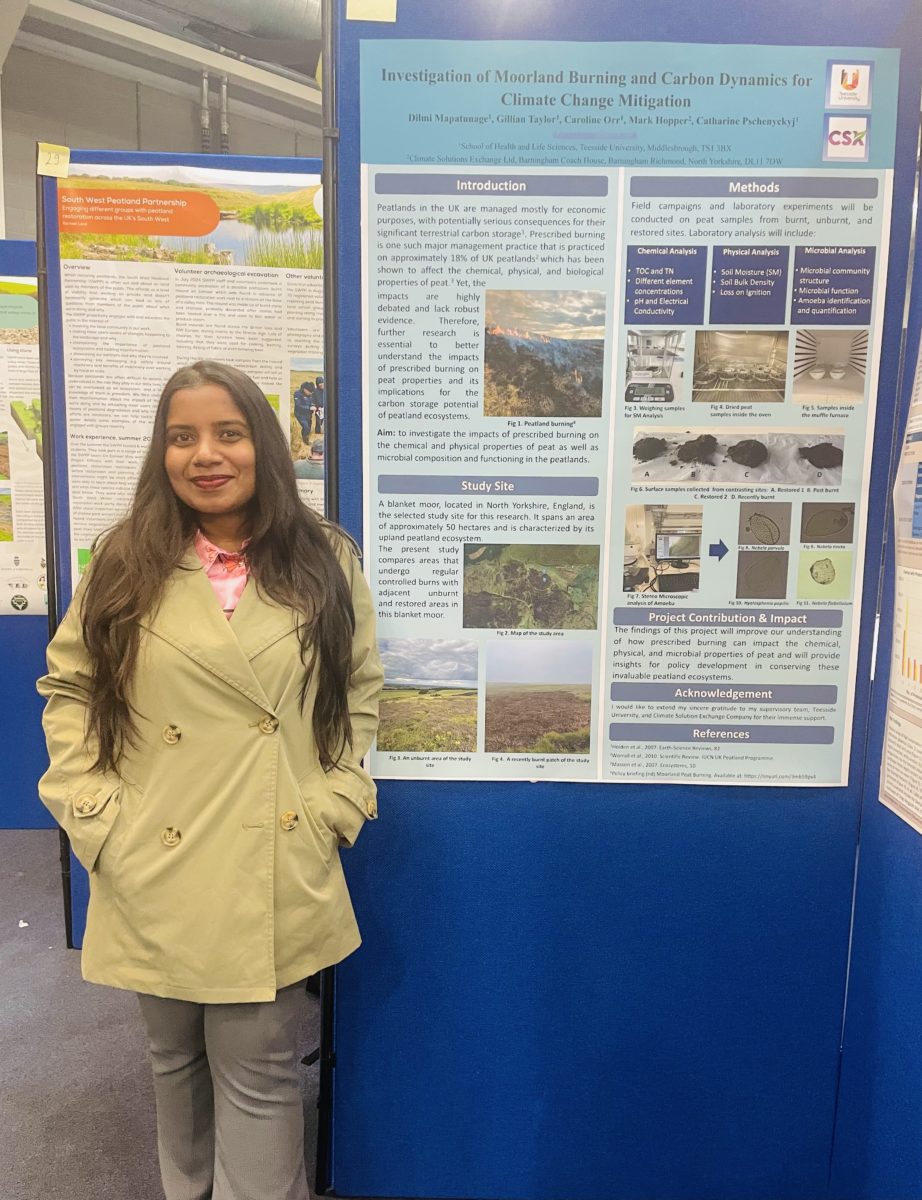Category: Uncategorised
Fatai Ilesanmi in GB Cave, examining cave formations at the BCRA Conference 2025
Behind the Scenes at Westminster: Reflections from the Royal Society Pairing Scheme
In March 2025, I had the privilege of being selected as one of only 30 researchers across the UK to take part in the Royal Society Pairing Scheme, which connects scientists with parliamentarians and civil servants. I was paired with Fayyaz Muneer, Deputy Director at HM Treasury, and spent an immersive week in Westminster during the Spring Statement.
The experience highlighted just how important it is for researchers to engage with policymakers in ways that are clear, timely, and solutions-focused. Policy makers are often keen to hear from researchers — but they need evidence that is accessible, framed around live debates, and offered in a way that supports decision-making.
From discussions with Baroness Freeman of Steventon and Baroness Brown of Cambridge, to shadowing Treasury teams, the week offered powerful insights into how science can inform government at the highest level.
You can read my full blog, published on the Royal Society’s website, here:
👉 Royal Society – Going Behind the Scenes at Westminster
New Publication: Tackling Microfibre Pollution Through Consumer Behaviour—Insights from MSc Research
We are proud to share that our MSc Environmental Management student, Babatunde Oluwadamilola, has published a peer-reviewed article titled “Beyond fast fashion: consumer behavior, microfibre pollution, and sustainable fashion choices in the UK” in the Journal of Environmental Studies and Sciences (Springer Nature).
This timely and policy-relevant study explores the often-overlooked issue of microfibre pollution from the fashion industry, shedding light on how UK consumers perceive and respond to the environmental impacts of clothing choices.
Drawing on the Theory of Planned Behaviour (TPB), extended with variables such as mitigation strategies, age, and income, the research analysed survey data from 350 UK participants using multinomial logistic regression and path analysis. The study found that:
-
Perceived behavioural control was the strongest predictor of intention to adopt sustainable fashion practices (β = 0.67),
-
Followed by subjective norms (β = 0.54) and attitudes (β = 0.28),
-
Mitigation strategies—including eco-labelling and public awareness campaigns—boosted these predictors significantly, both directly and indirectly,
-
Age and income further shaped the effectiveness of these drivers, with older and higher-income consumers showing stronger pro-sustainability intentions.
This research contributes important insights into the behavioural dimensions of environmental sustainability and provides evidence-based guidance for reducing fashion-related microfibre pollution.
We congratulate Oluwadamilola on this achievement, which exemplifies the impact and real-world relevance of student research in our department.
🔗 Read the full article here: https://link.springer.com/article/10.1007/s13412-025-01028-1
Empowering Climate Advocacy Through Science: Reflections from the Youth Climate Action Workshop in Nigeria
Our PhD student, Fatai Ilesanmi, recently contributed to a high-impact climate event in Nigeria, where he shared insights on innovative palaeoclimate research and youth-led environmental solutions.
Workshop Report
The Youth Climate Action, themed “Empowering the Next Generation for Climate Action,” was held on May 17, 2025, at the Oasis Event Center and Conference Hall in Osogbo, Osun State, Nigeria. It convened over 150 participants, including students, policymakers, youth leaders, researchers, NGOs, and other stakeholders. Organised by GreenEarth Conservation Impact and Awareness Initiative (GECIAI), the event aimed to raise awareness and foster youth engagement in addressing climate change through knowledge exchange and practical collaboration.
During the workshop, I delivered a presentation titled “Lack of Climate Observation Data for Climate Studies in Africa: Implication of Stalagmites as Climate Tools.” My talk addressed the persistent scarcity of long-term, high-resolution climate observation data in West and Central Africa—regions particularly vulnerable to climate variability. I highlighted the value of stalagmites as robust palaeoclimate proxies, capable of filling critical data gaps through geochemical and isotopic analysis. Stalagmites, archived in caves across Africa, can provide continuous records of past rainfall, temperature, and monsoon dynamics spanning thousands of years. These records are crucial for validating global climate models and informing regional adaptation strategies.
I also discussed methodological challenges, including accessibility to cave sites and analytical constraints, while advocating for interdisciplinary collaboration to advance stalagmite-based research.
The workshop underscored the importance of youth empowerment in climate advocacy. Through interactive sessions, participants co-developed strategies for engaging communities in environmental stewardship. I left the workshop inspired, better connected, and equipped with actionable tools to contribute to Africa’s climate resilience.
I am deeply grateful to GECIAI for organising this impactful and timely initiative.
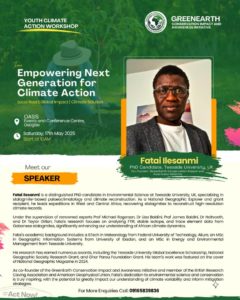
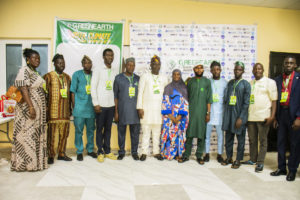
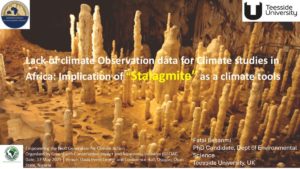
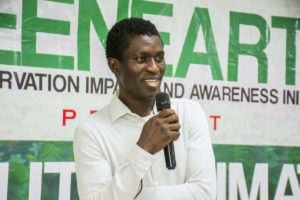
New publication: Acidity impacts on microbial diversity and litter decomposition for organic soils
Upland areas of the UK were highly impacted by sulphur deposition during the acid rain era of the 1970s-80s. As these soils gradually recover from acidification, they have been loosing increasing amounts of waterborne carbon, known as DOC (dissolved organic carbon). This has resulted in surface waters in peatland catchments becoming increasingly browner in colour, and represents a notable carbon loss from these soils (which may eventually enter the atmosphere as carbon dioxide).
But why is this happening? There is a strong evidence base supporting a physiochemical mechanism in organic soils responding to changing acidity. Low acidity results in DOC ‘clumping’ together, bringing it out of solution, but increasing pH enables this organic material to dissolve back into the soil solution, making it mobile once more. However, are there other mechanisms behind this trend? After all, microbial decomposition of organic matter produces DOC, and conditions become more suitable for microbial activity with increasing pH.
In this study published in Plant and Soil, led by Dr Catharine Pschenyckyj, we assessed the impact of changing acidity on microbial communities and decomposition of dead plant material (as a proxy for DOC production). This was part of a wider long-term field experiment in the Snowdonia and Peak District regions, in which acid rain, and recovery, was replicated.
Interestingly, changing acidity didn’t significantly impact the decomposition rates, DOC production, or microbial diversity. However, decomposition was faster in podzol soils compared to peat soils, leading to higher DOC production. This suggests that soil type and its physical and chemical properties play a bigger role in DOC release than decomposition. This study helps us understand the complex interactions in organic soil ecosystems recovering from acid pollution.
Find out more about this publication here: https://rdcu.be/edbhK
National Geographic photograph of the year
Our very own Dr Lisa Baldini is making the Teesside University headlines with her research project aiming to reconstruct past climate change in West Africa.
The full Teesside University press release can be found here.
PhD Student mini-conference
Our PhD community impressed yesterday during the Earth and Environment PhD min-conference. This was a wonderful opportunity for the students to get feedback and questions about their work, while strengthening the research culture within the department.
The programme was as follows:
Environmental PhD Mini Conference Schedule
27th November 2024, 2-4pm
Each student to give a 7-minute presentation followed by 5 minutes for questions and feedback.
2:00 Welcome and introduction
2:10 Beginnings for environmental storytelling
Alison Reid, PhD candidate at Newcastle University
2:25 How can land provide multiple benefits for current and future generations? The case of Stockton-on-Tees Borough Council.
Rach Butler, Carbon Reduction Coordinator at Stockton on Tees Borough Council, PhD candidate at Teesside University
2:40 Using Rainfall Isotopes to Decode Climate Variability: Implications for Stalagmite Studies in Western Africa
Fatai Ilesanmi, PhD candidate at Teesside University
2:55 Impact of prescribed burning on moorland carbon dynamics, microbial diversity and function
Dilmi Mapatunage, PhD candidate at Teesside University
3:10 Land-based solutions for climate change mitigation and adaptation: The case study of the Tees River catchment
Okechukwu Ignatius Eze, PhD candidate at Teesside University
3:25 Above and below-ground carbon stocks and biotic changes during rewilding
Austine Otabor, PhD candidate at Teesside University
PhD student attends IUCN Peatland Programme Conference 2024
PhD student Dilmi Mapatunage attended the IUCN Peatland Conference 2024, the largest gathering of 400 peatland experts, held in Aviemore, Scotland. The conference aims to showcase how the restoration of peatlands could pave the way towards transitioning into a green economy, and the role of healthy peatlands in supporting people and biodiversity by offering nature-based solutions.
The conference consisted of several plenary sessions on introducing the work of IUCN UK Peatland Programme and Peatland ACTION and delivering the key findings of the UK Peatland Strategy Report. Field visits to local peatland sites took place, to observe different peatland management and restoration techniques, combined with perfect weather and stunning views of the Scottish Highlands. Dilmi attended the Corr Riabhach demonstration site, which showcased peatland degradation and restoration efforts, such as erosion control and plant revegetation initiatives led by the United Nations. Dilmi presented a poster at the exhibition entitled, “Investigation of moorland burning and carbon dynamics for climate change mitigation”. Several delegates shared an interest in peatland burning and provided positive feedback and suggestions to refine and enhance the research.
The conference wrapped up with workshops and knowledge sharing sessions under different themes related to peatland management and restoration. Dilmi contributed to the ‘Translational palaeoecology and the art of collaboration’ workshop, engaging in discussions with a group of experts passionate about paleoecological records related to peatlands. Dilmi was inspired by the conference and looks forward to applying the feedback and suggestions received to further develop the research, and will attend more such meaningful conferences in the future.
New Study Addresses Nitrogen Accumulation in Soils for Better Environmental Management
A TU-Durham University collaboration has yielded a detailed nitrogen budget to assess how nitrogen moves across different land uses in a large, mixed land-use UK catchment. This newly published work highlights the importance of accurately measuring nitrogen (N) accumulation to mitigate its harmful impacts on climate and ecosystems.
The Trent catchment, known for its extensive water quality monitoring, provided a unique opportunity to map nitrogen flows and pinpoint where accumulation occurs. One key finding was the higher nitrogen build-up in grassland subsoils compared to arable land, revealing the complex interactions between land use, nitrogen, and soil health.
Excess nitrogen in soil can lead to water pollution, loss of biodiversity, and increased greenhouse gas emissions, making proper nutrient management essential. This study advances our understanding of nitrogen dynamics, providing valuable information toward sustainable environmental management. Continue reading “New Study Addresses Nitrogen Accumulation in Soils for Better Environmental Management”


